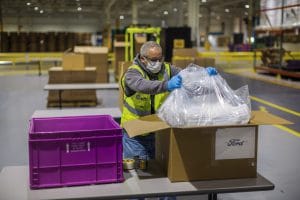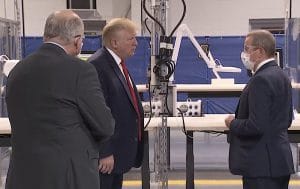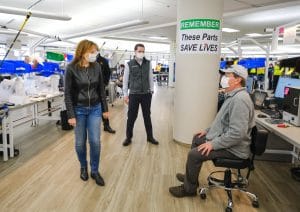
Ford produced the last of its contracted 50,000 face masks last week and wrapped up all pandemic-related production this week.
General Motors and Ford Motor Co. are wrapping up production of ventilators, face masks and other life-saving personal-protection equipment, a response to the COVID-19 pandemic that has become known as the “Arsenal of Health.”
Working with its partner, Ventec Life Systems under a $489 million federal contract, GM delivered the last of 30,000 ventilators on Monday. Ford topped 50,000 of the ventilators it was contracted to build last Friday but formally wrapped up production this week.
“Our drive to put critical care ventilators into production was fueled by thousands of people at GM, Ventec and our suppliers who all wanted to do their part to help save lives during the pandemic,” Mary Barra, GM chairman and CEO, in a statement announcing the end of the production program. “It was inspiring to see so many people achieve so much so quickly.”
(Trump praises Ford, workers, skips masks during tour of plant making ventilators.)
The two automakers were among the many U.S. companies that stepped in to assist as the coronavirus pandemic struck and it became obvious that there was a severe shortage of supplies, especially the PPE required by medical personnel, as well as equipment like ventilators needed to treat the most severely ill patients.

President Donald Trump tours a Ford plant making masks with Executive Chairman Bill Ford Jr., right, and CEO Jim Hackett.
Ford and GM announced they would team up with existing suppliers, GM with Washington-based Ventec Life Systems, Ford with FE Healthcare. Even as they shut down their parts and assembly plants due to the pandemic, they each carefully converted several facilities to handle production of the medical gear.
Ford has been producing ventilators at a suburban Detroit factory, with several others handling face shields and masks.
GM tooled up ventilator production at an electronics plant in Kokomo, Indiana, with other plants handling masks.
Over the course of a 154-day run, GM rolled out one ventilator, on average, every seven minutes, 30,000 in all. Ford ran at an even faster pace. Eventually completing 50,000 Model A-E ventilators under a $336 million federal contract.
(Ford, GM prepped to build ventilators, other essential medical gear.)
The move by the two manufacturers reminded some of how the domestic auto industry stepped in during World War II to produce guns, Jeeps, bombers and other supplies, earning the nickname, “the Arsenal of Democracy.”

General Motors Chairman and CEO Mary Barra talks with a GM employees at the company’s Kokomo, Indiana plant.
While they have ended producing ventilators, which are meant to assist the most severely ill patients breathe, Ford and GM say they aren’t completely stepping away from the needs created by the pandemic.
The bigger of the two on Tuesday announced it would donate 2 million face masks to Michigan public schools to help students return to classrooms. Production will wrap up at the end of this month.
For its part, Ford spokesperson Rachel McCleery said the automaker, “will continue to look for ways to address the needs of our communities and workforce as the COVID-19 pandemic continues.”
When the pandemic first hit there were reports of severe shortages of supplies such as masks and ventilators, especially in hard-hit communities like New York City and Detroit. That led to unnecessary deaths of not only patients but medical practitioners who, in many cases, had to make do with bandanas and scarves rather than medical-grade masks and other gear.
The equipment GM supplied proved to be “valuable tools enabling our medical team to save lives. I’m proud to say we have had many patients beat COVID-19, wean off the ventilator and safely return home,” said Dr. Suzanne Pham, of Weiss Memorial Hospital in Chicago.
(GM teams up with Ventec to ramp up production of ventilators of coronavirus pandemic.)
For now, those in charge of the federal stockpile say there are more than enough ventilators and other PPE to handle the current rate of infections. But the coronavirus has proven incredibly difficult to stamp out and the number of reported cases has begun to surge again, leading some experts to fear that things could get worse as cold weather settles in over the coming weeks and months.
